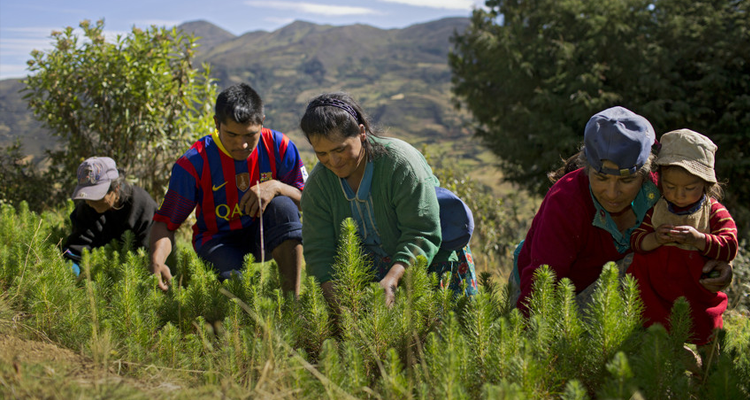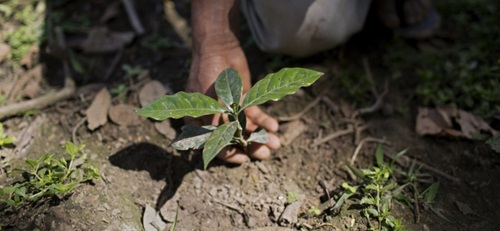by Angharad Hopkinson
Fairtrade is known for its work protecting farmers and workers around the world from exploitation. What many people don’t realise is that our work on trade and economic justice is urgently required to bring about climate justice.
Now is the time to shed light on this connection as the UK hosts this year’s United Nations climate change summit. We need to make sure that this year the voices of the most marginalised groups are heard, in ways that they haven’t been previously. Among them are the women who grow cocoa in West Africa.
During Fairtrade Fortnight this year we are once again focusing on cocoa farmers in West Africa and join them in their fight for living incomes. When cocoa farmers earn less than a living income, they can’t afford to send their children to school or provide enough nutritious food for their families. We estimate a living income for these farmers to be £1.86 a day, but now, a typical cocoa farmer in West Africa lives on less than 75p a day, with women earning as little as 23p a day.
How can we expect cocoa farmers to take expensive steps to adapt to climate change and reduce their environmental impact when they can’t afford the basics?
Fairtrade farmers must meet certain environmental standards designed to reduce pesticide use and deforestation. Fairtrade Standards forbid cutting down protected forests in order to plant more crops. The Fairtrade Minimum Price and Premium support Fairtrade farmers to make these changes, but other farmers are left without these safety nets.
Cocoa from deforested areas is far more carbon intensive than cocoa grown in previously farmed areas. In Côte d’Ivoire, it is estimated that 57% of land cultivated for cocoa outside certified sources originates from primary forest. But without action to keep farmer incomes stable, people will be forced to move into forested areas to make ends meet.
Longer term, the impact of the climate crisis, including rising temperatures and erratic rainfall, risks reducing cocoa yields. Many of the current cocoa growing regions in Ghana and Cote d’Ivoire will become too hot to grow cocoa by 2050. While in other areas, increases in rainfall may create ideal conditions for the spread of cocoa pests and diseases. Ebrottié Tanoh Florentin, a cocoa farmer in Côte d’Ivoire, has spoken out about the risks faced by cocoa farming communities in West Africa.
He says that, ‘Climate change is a global issue. We, the farmers, have to deal with its consequences every day. For instance, this year we lacked food because of the heat. The production decreased this year too, so this affects the economy. People harvested less and received less money. So we all suffer from the negative consequences of the climate: it impacts the environment and our economy.’
It is vital, therefore, that farmers receive the support they need to cope with the effects of climate change. We’d like the chocolate industry take an approach to living income that would see not just the payment of sustainable prices, but also support for farmers to produce more on less land and to grow other crops that are resistant to the effects of climate change.
Supporting living incomes is necessary both to help cocoa farmers cope with the worst effects of climate breakdown, and to prevent deforestation linked to cocoa production from making it even worse.
There is no climate justice without trade justice. Cocoa farmers are on the front line of the climate emergency. By buying Fairtrade you are supporting biodiversity, environmentally friendly farming and helping farmers adapt to and mitigate against the effects of climate change.
Find out how you can get involved with our campaign calling for cocoa farmers to earn a living income:
Where to buy Fairtrade products
Useful links
Fairtrade’s environmental Standards
Climate change food calculator (BBC)
Climate Smart cocoa – World Cocoa Foundation
You might also like

8 ways Fairtrade farmers protect the environment
4 June, 2018Farmers say the climate emergency is one of the number one threats they face. Millions of farmers around the world who rely on agriculture for their livelihoods are among the worst affected.

Climate crisis: Fairtrade farmers speak out
23 June, 2019The climate crisis is already badly affecting global food production. Fairtrade farmers like Ebrottié in Côte d’Ivoire, Zeddy in Kenya and Theresa in Nicaragua, suffer the effects, leaving them working longer, for less, and damaging their community.
Banner photo: Kouame N’Guessan Therese, Fairtrade Cocoa Farmer in Côte d’Ivoire

